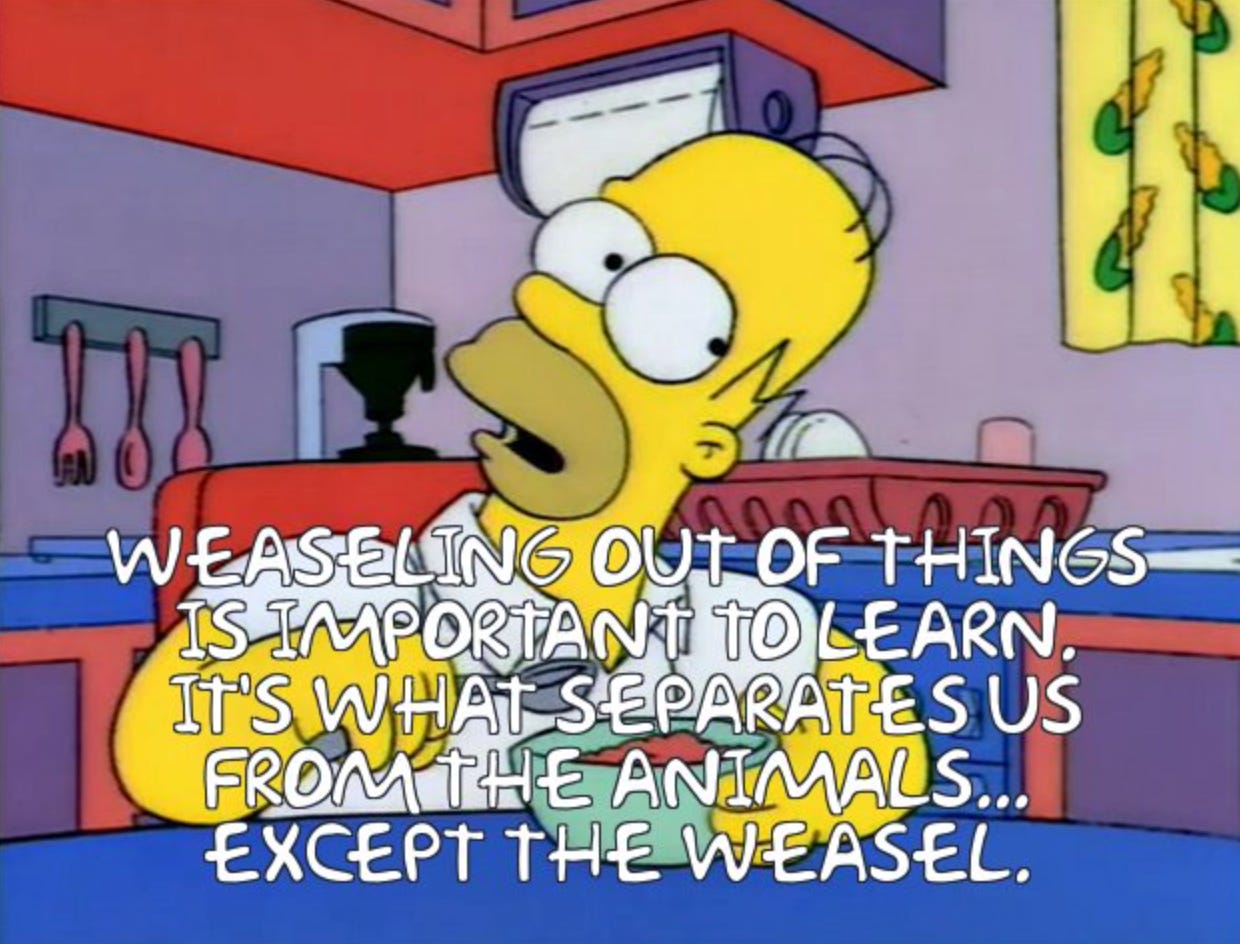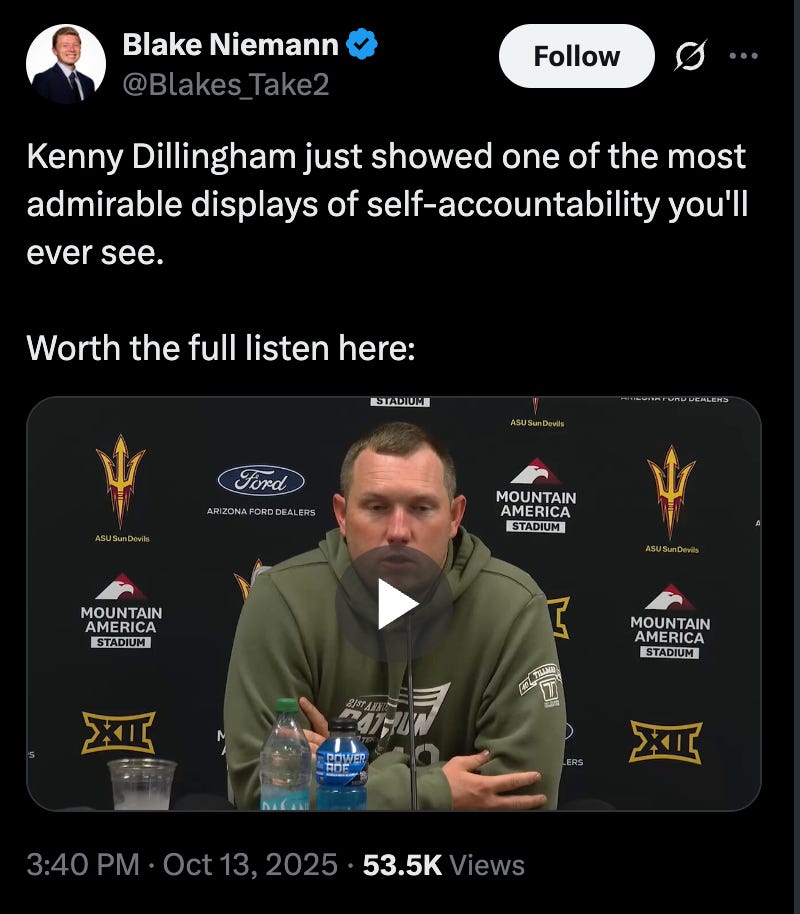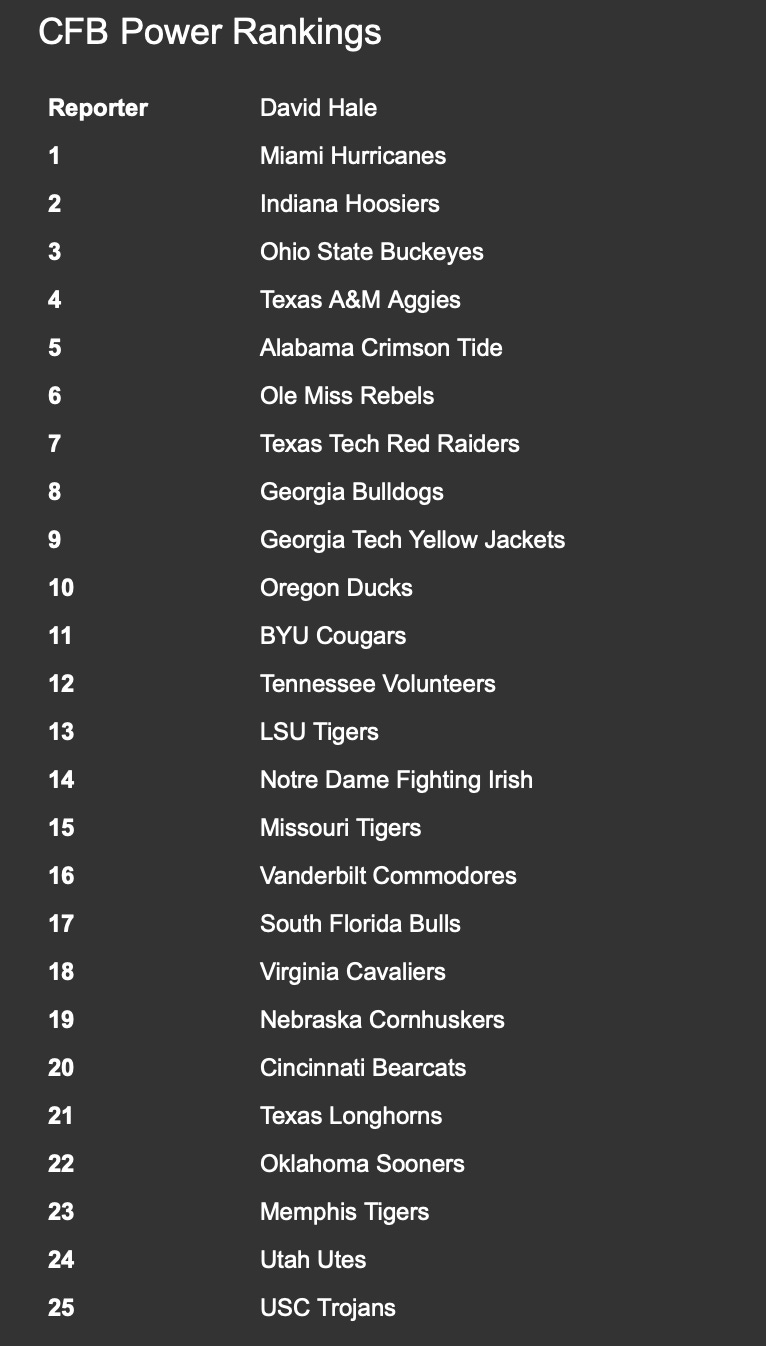It's not a lie... if you believe it
Bill Belichick insists all is fine at UNC. He says his team is improving. And as long as you don't believe anything you've seen the last six weeks, he might be right.
Here’s a dirty secret of the sports media business: Reporters pull punches.1
We do it for all sorts of reasons, from the political expediency of maintaining a relationship with a good source to our own sense of basic morality in not wanting to kick a guy when he’s down to, well, fear of getting yelled at or just a lack of good journalistic standards. It happens, and it’s not always a bad thing.
I say this because, as I look back at the story Andrea Adelson and I did on Bill Belichick before the season kicked off, I’m a bit mad at myself for pulling some punches.
To be sure, I think this included some very good reporting and it certainly didn’t present the situation at UNC in a positive light. For example...
“Everyone was running around like chickens with their heads cut off.”
“A couple times they brought in good players and ignored them on their visit,” a source with direct knowledge of the situation said. “There were times that the kids would be waiting 30, 45 minutes or an hour and then all of a sudden, you’re not meeting with Coach Belichick anymore, and we’ll go back to the airport.”
“They were flying through visitors,” the former member of the staff said. “It was unclear if Coach Belichick had evaluated the tape with how quickly they were bringing kids in.”
But we also left a lot on the cutting-room floor2 because the Tar Heels hadn’t yet played a game, because there was still optimism this team could be decent, because, for all the trusted information we’d gotten, so little was known about what was happening behind the scenes in Chapel Hill that it felt like a big risk to go scorched earth before a single play had unfolded at Kenan Stadium.
But, suffice it to say, very little of what’s happened since that story ran is a surprise to me.
Yes, there were some wildly inaccurate stories written last week. Belichick was not close to leaving. From my own reporting -- from sources who either are in a position to influence decision making or have been in the room when those folks are talking -- there is no serious push to make a change, and the odds of Belichick returning to Chapel Hill next year are pretty high. I chronicled what I’ve heard about all of this in a far-too-long tweet on Sunday.
But the bulk of the reporting that came out in the past week about a divided locker room, a transactional approach to relationships, outsized egos and poor communication, bad talent evaluations, and a lack of any real understanding of how college football works... well, that’s all stuff I’d heard before from numerous people I trust.
“It’s the arrogance of it all,” a university source told The Athletic. “Because they had success in the NFL — and by they, I mean Belichick only — they (thought) they could come in and replicate that without knowing how college football works.”
“There’s been no communication with coaches and parents, period,” a parent of a current UNC player said. “None, zero, zilch. Not one email from a coach, one text, phone call, nothing.”
Under Mack Brown, parents had relationships with coaches and their phone numbers. Coaches might call a parent if they felt something was going on with their son. Multiple sources have said that Belichick’s son, Brian, the defensive back/safeties coach, is very personable. Belichick’s son Steve, the defensive coordinator, they said, is the opposite.
“He has not talked or had a conversation with most of the guys on defense,” a source said. “They don’t even have his number.”3
The image of an aloof Belichick and GM Mike Lombardi at the helm, with little contrition for the the chaos they’re courting, is not something haughty Carolina is swallowing well.
Is everything in these stories entirely true? I can’t say because, frankly, Belichick doesn’t want anyone to know. Belichick vaguely denied basically all of the reports on Monday, but his lack of specificity only underscored that nothing he says can be taken at face value.
Realistically, when there’s this much smoke, there may not be an inferno, as some reported, but there are some brush fires ready to explode.
We can talk extensively about the product on the field, and that Belichick seems incapable of acknowledging just how bad it is. In his press conference on Monday, he alluded to the team’s improvement, by my count, 15 different times. Improvement from what? Infancy?
That this is somehow now a rebuild, despite it never being described as such earlier in the “process,” is still something some fans can wrap their arms around. That he’s “rebuilding” a team that went to six straight bowl games under Mack Brown and it still looks this bad is troubling, but again, a portion of the fan base wants to believe. That there is a talent deficit based in part on the timing of his hire is, perhaps, understandable4. But there’s no getting around the fact that, regardless of talent, this is an incredibly poorly coached team. We can see all of that with our own eyes.
But Belichick doesn’t care what we know to be true. He doesn’t care about us at all. Which is fine. That’s his prerogative, one that worked well in the NFL for nearly a quarter-century in New England.
But as Awful Announcing wrote, this isn’t the NFL.
College sports differ from professional sports in many ways. One of the key distinctions is the impact of factors outside the locker room. In the NFL, no matter what fans, media, or others think, the only opinion that matters is the owner’s. In college, boosters, fans, and the media exert considerable influence over recruiting, whether it involves high school students or players in the transfer portal. The kind of attention that Bill Belichick has brought to North Carolina has already affected the perception of his program.
Currently, Belichick appears to be arrogant and oblivious to those subtleties. In college, a coach needs to be the program’s most vocal cheerleader and the school’s top ambassador. You must constantly sell a positive image and a successful vision of the future. Those are skills Bill Belichick never had to develop in the pros. The NFL has a draft, and free agency is limited. It’s easier to control player movement.
After I’d finished with Belichick’s press conference today, I was scrolling through Twitter and came across this post with Arizona State coach Kenny Dillingham discussing accountability in the aftermath of a loss. It’s worth a listen.
Contrast Dillingham’s words with what we’ve heard from Belichick for the past six weeks. There couldn’t be a bigger difference in accountability.
Now, I’m not suggesting Belichick is not accountable, period. I’m saying that, after decades of pulling this routine in the NFL and being A-OK, that he does not feel any need to be remotely accountable to us -- the media, the public.
And frankly, he doesn’t have to be. We’re not owed that. But when he continues to -- pardon my French -- piss on our heads and tell us it’s raining, the response is going to be a serious backlash from media, from fans, from parents, from administrators.
Here’s what AD Bubba Cunningham -- a man with enough wisdom to have seen all the risks of the Belichick hire when others at UNC were simply sold on a get-rich-quick scheme -- said about the current situation.
“There’s a steeper learning curve than we all anticipated,” Cunningham said. “The gap between expectations and performance is more severe than what we expected, and that’s what creates a lot of attention.”
There are two sides to the formula Cunningham is discussing here.
The first is the on-field performance, which is objectively horrible. But that’s something that might’ve been OK if Belichick’s so-called “process” was conveyed to fans, to media, to the general public in any meaningful way. Because the second part of the formula is expectations, and Belichick didn’t care about those at all.
Belichick and his people have operated externally the same way so many of these reports suggest they work internally: With a brazen disrespect for anyone else’s expertise, with unyielding hubris, with a steadfast belief that, if you were silly enough to have believed this team would be good, well, that only underscores just how stupid you really are.
There was one quote from Belichick’s press conference Monday that I did find particularly enlightening though, even if he didn’t intend it to be.
“It’s a learning curve,” Belichick said. “We’re all in it together. But we’re making a lot of progress, and the process will eventually produce the results we want like they have everywhere else I’ve been.”
I, like several other reporters there, had pushed Belichick to account for specific mistakes he’d made, for examples of things he’d like to do over or would do better moving forward. What lessons have come from this awful start to the season?
He offered non-answers, of course.
But that quote does tell me something. It tells me that Belichick hasn’t learned the most important lesson here, that just because something worked for him so many times before in the NFL, it is not guaranteed to work again in college.
Belichick’s process may well prove us all wrong. Maybe in a year or two years, if he’s still in Chapel Hill, this program looks much better.
But right now, he sounds astonishingly out of touch, when all fans want to know -- all they’re really suggesting he’s obligated to offer -- is an assurance that he’s capable of still learning some new tricks.
Remember Hoosiers? Well, it’s back -- in football form!
In this week’s Game Day Final -- yes, this post is a day late because of Belichick -- I wrote about Indiana’s meteoric rise and how, amid all the change in college football the past few years, a team like the Hoosiers ascending to greatness really is a shocking development.
The advent of NIL, revenue sharing and the portal was supposed to simply make the rich richer, but the opposite has largely been true, and Indiana is Exhibit No. 1. Until 2020, Taylor Swift had not been alive during a year in which the Hoosiers finished ranked in the AP Top 25, and stunningly she hadn’t written a single song about how sad that was. Even that 2020 season was mostly a figment of COVID’s artificial reality, and the program regressed to 2-10 a season later. It’s almost impossible to overstate just how bleak Indiana’s football history had been, so bad that even amid all the basketball program’s malaise, no one ever thought, “Hey, maybe we could care about football instead.” Indiana was cheerfully irrelevant, not even interestingly bad, but rather just unnecessary to any larger conversation. Like the protagonist of every John Mellencamp song, Indiana was a program destined to relive the indignities of every past generation, no matter how hard it fought against the crushing obviousness of it all. It was Jack and Diane and Gerry DiNardo.
Then Curt Cignetti arrived, overhauled the roster, brashly told the world to Google him, and after scrolling past 73 sponsored results selling military-grade generators, you learned that the Hoosiers coach had won everywhere he had ever been, and he wasn’t about to change now.
Interestingly, Duke coach Manny Diaz hit on the same topic during his press conference Monday. He’d been asked about Penn State and coaching changes and, as a tangent to another interesting argument that conference expansion has created a situation where expectations will exceed reality for far more teams, he hit on something critical about what Indiana’s rise means for the sport.
“Look at what happened in Eugene [with Indiana winning], where if you have a university that is aligned top to bottom that wants to play championship football, you can have a championship program anywhere. That doesn’t mean win a national championship, because everybody wants to win a national championship. But you can compete for championships anywhere. The landscape has changed. There are legacy brands that believe you still have to be a legacy brand for that to happen. For a long time, that was true. I don’t believe it’s true anymore, and I think there’s a lot of evidence.”
It’s also worth noting, I think, that the inverse is true, too. People freaked out about Florida State’s 2-10 season last year, but I wrote this spring about how the Seminoles’ struggles might become the new normal. Look at the rest of Penn State’s schedule now without Drew Allar at QB and -- well, 3-9 is entirely in the cards.
What’s your QB music?
I’m in Durham today for interviews with Duke folks for an ACC Network feature on Darian Mensah that will air during “The Huddle” on Saturday. Keep an eye out for it, I think it’s going to be really good.
One interesting nugget on Mensah: I’d asked Duke OC Johnathan Brewer why they were so enamored with Mensah as a transfer. He said it was how Mensah handled himself in “a dirty pocket.” Duke wants to hit explosives, and that usually means getting guys open downfield. That usually means holding on to the ball an extra tick or two, and that means a QB has to be comfortable when a lot is happening around him.
I asked Manny Diaz about this, too, and he shared a story from the Cal game. He was talking with Justin Wilcox, he said, and shared his theory that all QBs are, figuratively, listening to music in their helmets as the play happens.
“Some guys, the minute they get pressured, they’re listening to speed metal,” Diaz said. “Some guys have classical music. The guy at Cal [Jaron-Keawe Sagapolutele], he’s listening to, like, Hawaiian ukulele music. He’s so calm for a quarterback.”
I may need to do a story asking QBs what music is in their heads each time they drop back to pass. For me, of course, it’d be “Why Can’t We Be Friends?”
What else is David working on?
On this week’s Inside ACCess, we’re welcoming Louisville head coach Jeff Brohm to preview the Cardinals’ big Friday matchup with Miami, along with our pal Jeff Cameron, who’ll discuss what’s going on with Florida State amid a three-game losing streak.
We’ll also be revealing Andrea and I’d mid-season All-ACC team and sharing pictures of Brent Key’s Halloween display at his house.
Don’t miss it! Show airs Thursday at 5 p.m. on ACCN or... please, please, please!... subscribe to the podcast version of the show HERE.
Speaking of the Louisville-Miami game... I’ll be there! If it’s half as good as last year’s showdown between the Canes and Cards, it should be a fun one. I’ll also be joining ACC PM before the game to preview the action from Miami (Gardens).
How’s David voting?
This week’s ESPN power ranking ballot:
And this week’s ACC tiers:
-The Best of Everything
Miami
-Running Down a Dream
GT
Duke
Virginia
-Won’t Back Down
Lou
SMU
Pitt
-You Wreck Me
Clemson
FSU
-Change of Heart
Wake
Cal
NC State
-Breakdown
Cuse
-Even the Losers
VT
Stanford
-Free Fallin’
BC
-Straight Into Darkness
UNC
They also occasionally throw unnecessary punches, which I think is bad. Pulling punches is sort of the price of doing business — especially if you have any empathy for the folks you cover.
Mostly about relationships. Lombardi had been lambasted by numerous folks we talked to for being entirely transactional and incredibly dismissive of others who’d been at UNC for a while.
When Belichick filled out his staff, I commented to Andrea that it had the feel of Bobby Petrino’s last staff at Louisville — family members, retreads and Garrick McGee. And one of the complaints that came from Cards’ players after Petrino was finally fired was they had zero communication with their position coaches and many didn’t even have their cell phone numbers. Scott Satterfield has told me the team he inherited there was the most mentally broken he’d ever seen. So, the parallels to UNC are… not good.
Belichick’s old pal Bill O’Brien arrived at Boston College last year on Feb. 9 -- nearly two full months later than the time Belichick was hired at UNC the following year -- and yet the Eagles still went 7-5 with far fewer resources to work with. Interesting.




